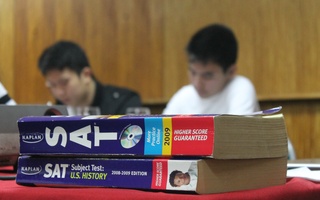The college admissions process is always a time of stress and uncertainty, and new changes to the SAT will keep it that way. The College Board is rolling out a new SAT exam with a 1600-point scale, an optional essay portion, a more narrowly focused math section, fewer obscure vocabulary words, no penalization for incorrect answers, and reading comprehension questions that weave in information from other subjects.
The redesigned SAT also features more difficult reading material in terms of both the reading and math sections. While the number of words in the reading section and the percentage of word problems in the math section have remained constant, outside analysts have said that the new exam contains more difficult reading material in terms of both diction and idea. For example, the new SAT has eliminated sentence-completion questions in favor of reading passages from the likes of John Locke and Herman Melville. Even the math problems have a greater sophistication, with one word question beginning, “An anthropologist studies a woman’s femur that was uncovered in Madagascar…”
We are concerned that these changes to the SAT reduce the test’s capacity to measure essential skills like reading proficiency and math ability, while unfairly advantaging students of privileged socioeconomic, racial, and cultural groups. By one estimate, the new math test is 50 percent reading comprehension, giving students the challenge of “wad[ing] through all the language to isolate the math.” This disadvantages students who come from families that do not speak English as a first language and could hinder such students’ performances in the math section.
Moreover, on the reading comprehension side of the new SAT, the inclusion of texts from eminent authors could penalize students of similar backgrounds. While Locke’s writing may be familiar to students who grew up in households or attended schools where they were exposed to that kind of literature, other students who grew up without that prior exposure could be seeing these texts for the first time on the SAT. This creates an uneven playing field with some students entering the exam with a significant leg up.
We acknowledge that it is important to increase the rigor of the reading section and to include texts that mirror the difficulty of what students are expected to read in college. Therefore, in order to avoid disadvantaging certain demographics while maintaining an increased level of rigor, we encourage the College Board to include texts that are not purely Western-centric. Another option is to include texts that are more modern, or even texts that were crafted for the very purpose of inclusion on the SAT. This would help ensure that every student taking the SAT is reading these texts for the first time without prior knowledge.
For these reasons, we urge Harvard to scrutinize the revamped SAT and maintain a holistic approach to admissions as these changes are implemented and examined. Since there is not yet data on how the new SAT will affect different demographics, it would perhaps be best if Harvard would indicate a preference for the ACT in the meantime.
Read more in Opinion
Florida is EverythingRecommended Articles
-
A Flawed Way to TestThe SAT I college admissions examination has deservedly been criticized for a wide variety of reasons—it is socioeconomically and racially
-
 Numerous Changes Unveiled for the SAT Starting Spring 2016
Numerous Changes Unveiled for the SAT Starting Spring 2016 -
 The Most Notorious Section Phrases
The Most Notorious Section Phrases -
The Types of People at MQCIf you've taken a math class at Harvard, you've been to MQC. And we know you've seen all of these people.
-
 Harvard Applicants No Longer Required to Submit SAT, ACT Writing Scores
Harvard Applicants No Longer Required to Submit SAT, ACT Writing Scores













